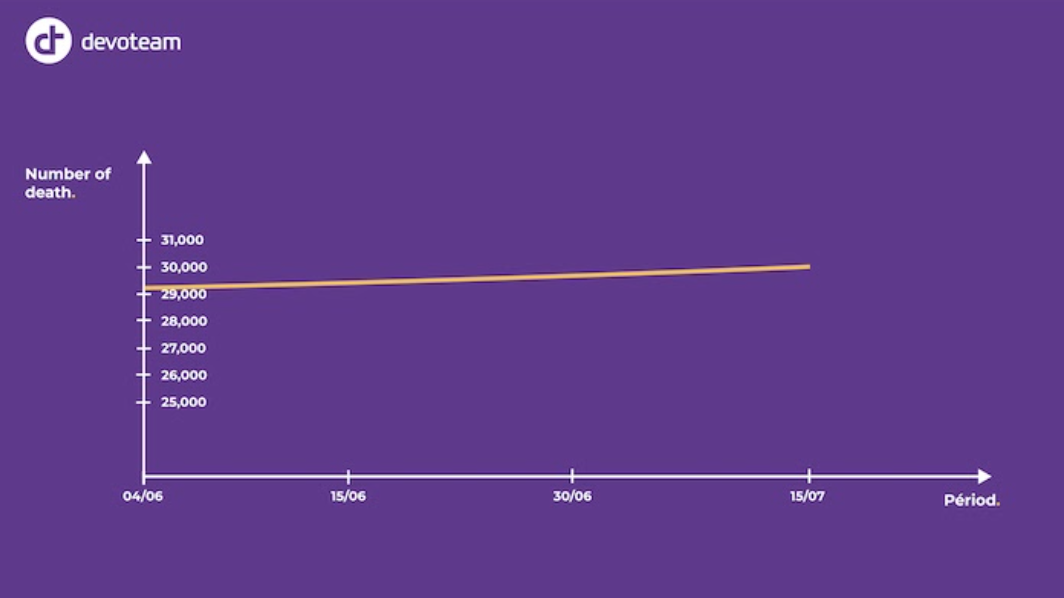No black scenario of a 2nd wave of Covid-19 for this summer or next winter. The study carried out by Devoteam’s data scientists, based on AI modelling of the spread and strength of the Covid-19 pandemic in France, reveals that the probability of a second wave is extremely low, with a rate of less than 1.5%.
It outlines scenarios for post-lockdown. If the measures are correctly applied, the epidemic curve will flatten out, with 30,293 deaths in France on July 15th, i.e. 1,272 more than today (29,021 on June 4th). The virus will have lost its strength by the start of the summer holidays.
Although the number of infected people may increase slightly again with the coming winter, it will not result in a drastic increase in mortality. In fact, we have more hindsight on the virus and its impact on the body in different cases: healthy people, diabetics, the elderly, people with cardiovascular risk factors, etc.
In addition, France has developed expertise in the early diagnosis of the disease without waiting for the results of the PCR test and the evaluation of the primary and primary-secondary symptoms of the disease. As a result, the care is much quicker, which considerably reduces mortality for people at risk – and even more for young people at risk, since they are more responsive than the elderly to treatments when diagnosed early.
These scenarios are based on the continuity of careful rules, in particular the detection and isolation of any symptomatic person as well as the systematic tracing of their contacts, the maintenance of social distancing and the wear of face masks.
“In the models, the seasonality of the disease was not taken into account,” explains Aymen Chakhari, AI Director at Devoteam. “We do not know yet what impact summer can have on the virus, nor the behaviour of people. However, these models are used to make simulations based on various assumptions to anticipate the evolution of the epidemic.”
Modelling based on AI leads to optimistic conclusions, even though the basic assumptions are particularly cautious.
Without being predictions, these models nevertheless give hope: Covid-19 is certainly not behind us yet and is far from having disappeared. However, adapting our way of life and applying the necessary measures in the coming months will enable us to live with the virus rather than suffer from it, and thus avoid a new strict lockdown, destructive for the economy and society.
This study is based on hybrid regression approaches coupled with reinforcement learning Bandit models and the Bayesian SEIR model [1]. It takes into account primary and primary-secondary symptoms of COVID-19 and data reported by the French emergency departments for visits or calls.
The team of data scientists used NLP (Natural Language Processing) approaches to extract relevant information from several questionnaires used by emergency physicians after the end of lockdown. The idea is to point out worrying symptoms that could have been reduced by an undetected positive patient, taking into account for example symptoms specific to the elderly (confusion, fall, worsening of general condition…), and then to give scores of contamination and aggravation to these people (intensive care or not, with a percentage of death, based on the protocols used in the emergency room), according to other parameters such as the number of people in their circle, age, sex and others.
These different extracted scores are then injected into our model according to a probabilistic stochastic process mixed with a fine clustering model of the French population (age, sex, department, behavior by department, …).

Sources :[1] https://wp.bcamath.org/news/en/seir-bayesian-model/